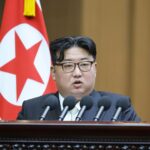
North Korea officially repudiates ‘peaceful reunification’ in favor of total domination.
North Korea’s Supreme Leader Kim Jong Un last week eviscerated any remaining pretense that his regime seeks peaceful reunification with South Korea. Now that Pyongyang has nearly developed the ability to deliver a nuclear warhead on an intercontinental ballistic missile, Mr. Kim has decided to scrap almost 80 years of intra-Korean policy.
In a Castro-length speech filled with rhetoric about America’s “policy of confrontation,” Mr. Kim announced his decision to strip the North’s “constitution” of all vestiges of peaceful reunification and to eliminate the government offices handling the issue. By effectively recognizing that there are two states on the Korean Peninsula, Mr. Kim has ensured there is no turning back. If war breaks out, he said, the North plans on “completely occupying, subjugating and reclaiming” South Korea and annexing it “as a part of the territory of our Republic.”
Mr. Kim’s belligerence and constitutional changes are bell ringers, the strongest possible signals of his intentions. The audience is both domestic and global. His rhetoric exposes how the South Korean left’s “sunshine policy” of détente and appeasement is not only wrong but dangerous. Mr. Kim refers to Seoul as Pyongyang’s “primary foe and invariable principal enemy.”
Over the years, many credulous South Korean and American leaders have accepted the North’s claims that it pursued nuclear weapons only because it was afraid of being attacked. These observers decided that persuading the Kim dynasty to abandon its nuclear objectives was a matter of proving that the U.S. had no “hostile intent” toward the North. This argument failed to grasp that the regime wanted nuclear weapons to pursue reunification its own way—the North absorbing the South, not the other way around. Using nuclear weapons to threaten Seoul’s allies and neighbors, Pyongyang sought U.S. withdrawal from South Korea. Mr. Kim wanted to convince the Americans to abandon the South Koreans in the event of an invasion.
Counting on weak U.S. leaders who didn’t see South Korea as a strategic asset, and whom they could subject to nuclear blackmail, the Kims followed a version of Deng Xiaoping’s “hide and bide” approach: concealing their growing nuclear and ballistic-missile programs and awaiting a docile regime in Washington. Today, the North sees its moment at hand in a weak Joe Biden—or a feckless Donald Trump, who unilaterally canceled joint U.S.-South Korea military exercises in 2018 without receiving anything in return.
Moreover, despite the “no-limits partnership” between Moscow and Beijing, Mr. Kim has regained sufficient leverage to be able to play Russia against China. His grandfather Kim Il Sung did the same during the Cold War. In 1950, neither Joseph Stalin nor Mao Zedong was enthusiastic about North Korea attacking across the 38th parallel, which they both feared would provoke war with the U.S. Kim Il Sung nonetheless persuaded both leaders that the other supported invasion. On June 25, 1950, Pyongyang caught Seoul and Washington by surprise and nearly drove U.S. forces into the sea.
After the Soviet Union collapsed, Moscow’s influence in Pyongyang waned considerably, increasing the North’s reliance on Beijing for its survival. Now equipped with nuclear capabilities and increasingly potent delivery systems, Mr. Kim remembers his grandfather’s game plan. Russia’s failures in Ukraine opened an opportunity for realignment that Mr. Kim swiftly seized, arming Russia at a critical time. Vladimir Putin will soon have a chance to say thanks in person. The Russian leader has announced plans to visit North Korea at “an early date.”
The U.S. failure to repulse Russia’s invasion of Ukraine and Iran’s “ring of fire” strategy against Israel is undoubtedly prompting considerable deliberation in China. While Ukraine wasn’t overrun, it is far from being victorious, thereby proving to the world that the West will tolerate unprovoked aggression. In the Middle East, Americans and Israelis disagree on how to prosecute the war on Hamas, likely to the detriment of both countries. Mr. Trump’s only contribution to date has been to say that he’ll resolve both conflicts quickly, details to follow.
With the Biden administration overwhelmed and a presidential election looming, Pyongyang and Beijing may well believe their window of opportunity has arrived. By rallying the North’s people, rewriting its constitution, and abolishing the machinery of reunification diplomacy, Mr. Kim could be preparing to jump through it.
This article was first published in Wall Street Journal on January 25, 2024. Click here to read the original article.